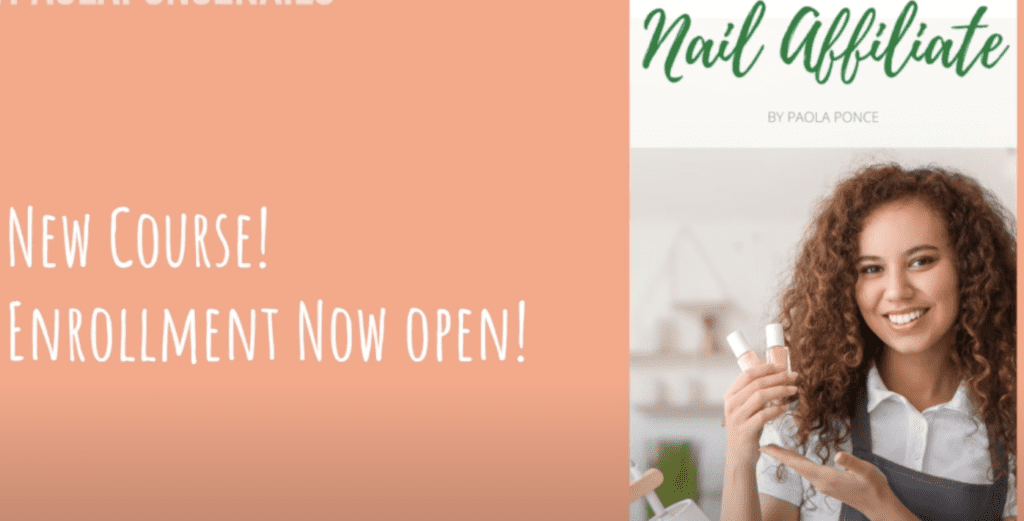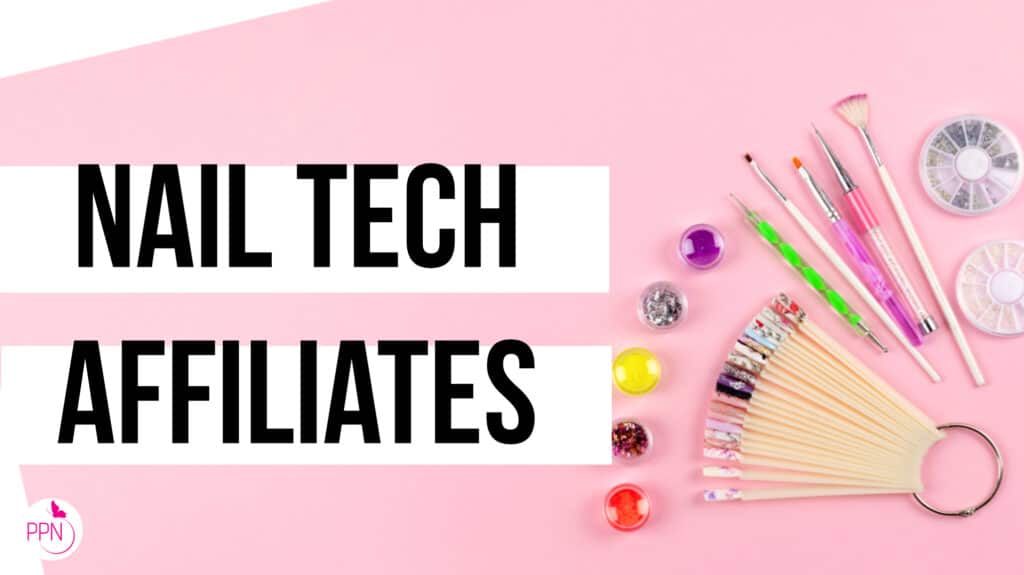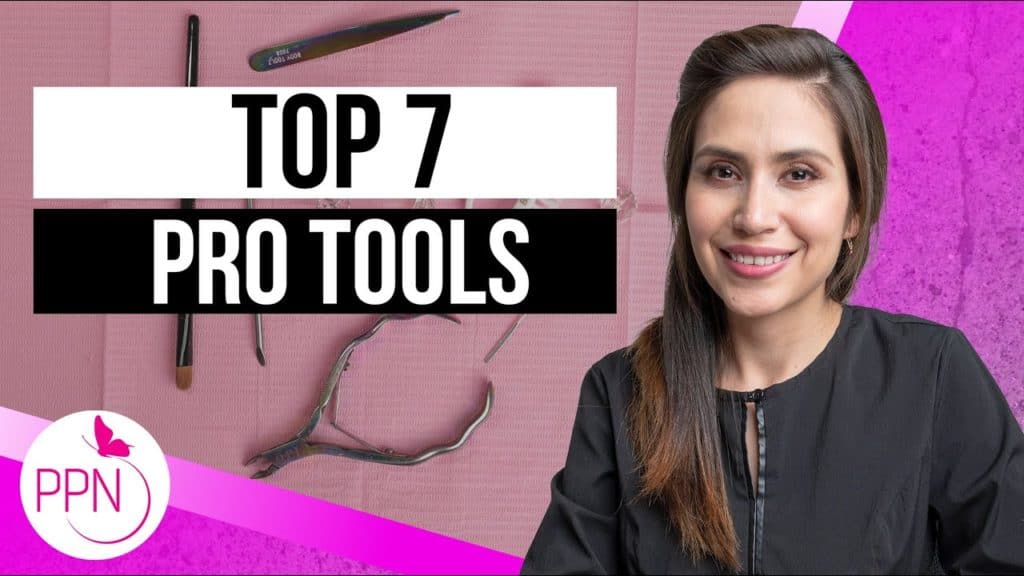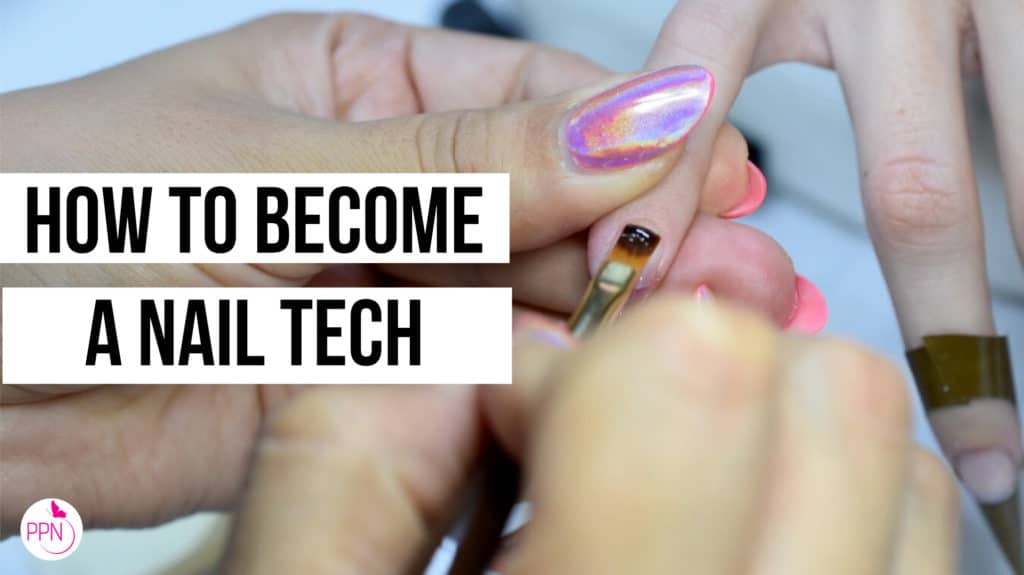Today’s topic will prepare you to consider whether becoming an affiliate is the next big step in your nail business or hobby.
Becoming an affiliate for nail companies is an excellent opportunity for nail stylists to consider when they find themselves consistently using the same products over and over again, in the salon or via social media.
Today we’ll be breaking down the type of opportunities you can expect when inquiring about becoming a brand partner as an affiliate.
Today’s topic is super timely, as I’m finishing my Nail Affiliate Course. Nail affiliate is now part of my course suite, and you’ll get this and all of my other signature courses when you enroll in MGN PRO.

If making additional income as an affiliate sounds like a great way to supplement your income, then keep reading and take notes.
Alright, let’s break this nail affiliate thing down.
Here are the 3 questions we’ll be answering today.
#1 What is an affiliate?
#2 Who should consider this revenue share-type opportunity?
And
#3 How are your sales tracked as an affiliate?
Let’s start,

An affiliate is a business relationship between an individual and a business that sells services or goods. It is a symbiotic relationship where the affiliate promotes the business’s products for some sort of compensation.
The business owner gets two big benefits from the affiliate promoting their products: traffic and sales.
Simply put, the affiliate refers its audience to a particular good or service and gets a commission when the referral makes a qualifying purchase.
Products can be physical or digital. An example of a physical products are gels and glitters. An example of a digital product is a course or e-book.
A synonym for an affiliate is a publisher; sometimes, the word “partner” is also used to describe this business relationship.

I believe two kinds of candidates should consider becoming an affiliate.
Let’s start with
#1 The person who always uses the same products.
Whether you’re a salon nail tech or a content-creating DIY’er, you should consider becoming an affiliate when you have narrowed your product choices down. Meaning you’re not using anything and everything coming your way but rather find yourself using the same products repeatedly.
You most likely use the same products repeatedly because you believe in their quality or enjoy using them. Because of this, promoting them will come super easy and natural to you as an affiliate for those products.
You’ll decrease insecurities when promoting them and experience feeling less sales-y.
The second type of person who should consider becoming an affiliate is,
#2 The person who is consistently creating content
Again, whether you’re a content-creating salon nail tech or a content-creating DIY’er, you should consider becoming an affiliate if you create QUALITY content on a schedule. The two keywords to pay attention to here are quality & schedule.
Suppose you are randomly creating content, sometimes w/o much intention or purpose. In that case, you may struggle to connect with your audience about why they should buy the product you are promoting.
Doing content creation sporadically can also make your affiliate income inconsistent and unsustainable.
If you take your affiliate partnerships seriously, you will make quality content on a schedule, and this will help make your affiliate income more steady.
You can create content as an affiliate via YouTube, a blog, a podcast commercial, or social media platforms like Instagram and TikTok.

Sales as an affiliate are tracked via n unique affiliate link or a unique code that the business for whom you are creating content generates using affiliate software.
Some affiliates will do both for you, a unique affiliate link or code. Others will do one or the other.
I prefer when affiliates issue both an affiliate link and code for two reasons:
Reason #1 If the referral forgets to enter the code, which happens, or if they use a sale promotion code instead of yours, you will still get credited for the sale because the buyer’s acquisition can be tracked to you via your unique affiliate link.
So yes, your referral took advantage of another promotional code. Still, the affiliate software ensures you get the commission for the sale because it tracks it.
Reason# 2 is that when the business you are referring is running a sale, they will not allow multiple coupon codes at checkout (totally understandable). This means that your affiliate code is not valid for that sale period. This is no problem if you have an affiliate link tracking your referrals. You will still be credited your commissions.
This is more of a disadvantage to your partner, the business owner.
That is because you, as an affiliate, have no incentive to promote their sale during that period. This gives that sale event less visibility, as all the marketing efforts are left to them and only them to ensure everyone knows about the sale.
But if you understand algorithm numbers, you know that social media gives you only about 1% visibility in your audience’s feeds or stories, and email about 20–30% visibility with your audience, which can translate to lower sales and less income.
Let me share a little success story while we are on this topic.
In the past, one of my students generated over $15,000 in sales to her affiliate partner over a one-weekend sale; because she had an affiliate link. Because she had an incentive to promote the sale, she scheduled time to create a small campaign of posts using her favorite items from that partner’s business, generating income for both her and the affiliate partner.
That’s $15,000 additional revenue to that company in one weekend from one affiliate.
By the way, she made at least $1,500 in one weekend for herself.
Can you imagine if that company has even just five other affiliates that do the same with a similar audience size? That’s $75,000 of additional revenue via affiliate participation in the promotion.
So leaving affiliates out of a promotion can lead to less visibility of a sale event, leading to less revenue for both affiliate and the business owner partner.
I firmly believe that affiliates should be supported and kept in the loop of upcoming sales so everyone can benefit.
The business owner gets significant visibility and, therefore, sales
The affiliate makes money (especially in these times, this little bit of income can mean so much for a nail tech or content creator). Also, the nail community benefits by getting a price break on their favorite products and staying on top of the sale via the affiliate’s and business owners’ communication.
Ok, this last one was a bit of a rant. Still, it can benefit those already affiliates or businesses considering adding an affiliate program to their business. To know the pros and cons.
Let’s recap today’s top 3 points…
#1 An affiliate is a business relationship where an individual refers physical or digital products in return for a commission.
#2 You should consider becoming an affiliate if you always use the same products or are consistently creating content.
#3 Your sales as an affiliate are tracked via link and code. Consider asking for both if that is possible.
Also, note that affiliate percentages do vary. In my experience, anywhere from 8-50%, with 10% being the most common, and the commission is paid once per month.
Overall, affiliate partnerships are intended to be long-term, with both parties consistently providing for each other.
If you would like to learn more about affiliate marketing, including how to pitch yourself even if you just have a small following or learn more specific strategies to increase your sales once you become an affiliate. I want to encourage you to join me inside MGN PRO. You’ll get my new Nail Affiliate and my entire suite of signature courses. View all the details here.
Thanks for joining us today! If you loved this topic, I post topics like this weekly, so consider subscribing to be the first to know when our next topic posts. Thank you again, and bye for now.
Loved this blog? Then I think you’ll love learning more about my journey as a specialized gel nail solopreneur in the nail industry. Click here to get instant access. These blogs are copyrighted material, and any use of this blog is not permitted without written concern first. Some of these blogs contain affiliate links that give us a small commission when qualifying purchases are made. Thank you for your support that helps us to continue creating valuable resources and content like this.



